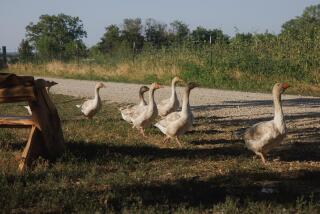Quest for Quality of Life Turns Engineer Into Farmer : Lifestyle: Allen Carr traded job designing computer chips for 80 acres and Tyson Foods contract.
- Share via
VERONA, Mo. — Allen Carr was living the good life in Colorado with a loving wife and family, a well-paying job and a $200,000 house on five acres in the mountains. But he wasn’t happy.
Stress brought on by 50-hour-plus weeks designing computer chips for military aircraft, including the space shuttle, was taking a toll. He often arrived home exhausted, with little time to spend with his son and daughter.
“The money was real good, but I got so sick of the politics and the pressures,” Carr said.
So Allen and Linda Carr did something daring. The city-raised electrical engineer, whose agriculture expertise consisted of growing tomatoes in his garden, and his wife, a nurse, quit their jobs in January, 1994, and moved to the Ozarks. They bought a farm and became, of all things, chicken and cattle farmers.
The real-life takeoff on “Green Acres,” the old TV series, “fits us like it was predestined to happen,” said Allen Carr, 36.
The Carrs’ eyes light up when they talk about their first year as farmers, from that anxious day when the initial truckload of 90,000 day-old chicks rumbled up the driveway to the birth of their first calf.
“We love being farmers,” said Linda Carr, 38, although she shudders at one of her duties--pulling the heads off diseased and dying chicks, a preferred industry method of euthanizing poultry.
Allen Carr had worked for the United Technologies Micro Electronics Center, a military contractor in Colorado Springs. When he told a friend he wanted a job offering fresh air and no computers, she mentioned that a friend in Texas raised chickens for Tyson Foods Inc., the Arkansas-based poultry giant.
“Linda and I looked at each other like, ‘Ding!’ ” Allen Carr said.
The two city slickers called a toll-free number listed on a package of Tyson chicken and eventually were put in touch with officials at the company’s plant at Monett, in the heart of Missouri’s thriving poultry belt.
Tyson Foods and other area poultry companies listened politely but rejected the couple’s offer to move to the area and become contract growers.
“They said they didn’t want to take a chance on somebody who’s never been a farmer, who doesn’t know what they’re doing,” Linda Carr said.
But the Carrs had done plenty of research and were determined to go to Missouri as poultry farmers. In July, 1993, Linda Carr left her family behind, took a job at a hospital in Monett, Mo., and began scouting for a farm.
Meanwhile, Tyson changed its mind and agreed to contract with the Carrs if they found a suitable farm. They did--an 80-acre former dairy farm, including a four-bedroom house, barn and outbuildings--for $120,000.
The Carrs had four 40-by-400-foot brooder houses built, where chicks supplied by Tyson grow into four-pound broilers in six weeks. The company also provides feed and technical advice.
“I basically manage the chicks and care for them,” Allen Carr said. “One semi-truck brings 93,000 baby chicks, and they leave for the processing plant 42 days later on 17 semi-trucks.”
The Carrs chuckle at the memory of their first shipment of chicks.
“We were walking around in a daze,” she said. “We didn’t sleep. They just said, ‘Do this and do this.’ Each day Tyson would help us get through another day, and eventually we started relaxing.”
Tyson spokesman Brett Martin conceded that the company initially was “a little bit spooked” by Allen Carr, questioning why he would give up a good job to make less money raising chickens. But those fears have been put to rest.
“They’re doing a wonderful job for us,” Martin said. “It’s obvious that Allen really enjoys the farm life. I feel like they’ll be here as long as they’re able to grow chickens, for years and years.”
The Carrs grew so confident that they decided to buy 20 head of cattle, even though they knew less about cattle than about chickens.
“I’ve been pestering the extension agent on the cattle,” Allen Carr said, referring to the University of Missouri Extension Service, which acts as a consultant to farmers. “It’s been ‘What the heck do you do with these things? I don’t know anything about them.’ And I still don’t know anything, but they’re having babies--my bull did his thing.”
The couple’s children, Jeff, 10, and Lindsay, 9, love living on a farm, Linda Carr said. They fish for catfish stocked in several ponds and earn spending money by cleaning the chickens’ feed trays.
One of the biggest benefits of being a farmer is having more time to spend with his children, Allen Carr said. He helps them with their homework and often has dinner ready by the time his wife gets home from the hospital in nearby Aurora, where she works part time.
“I’m a lot more involved with the kids and with Linda,” he said. “(Farming) just fits us much better.”
Although they don’t make nearly as much money as they did in Colorado, the Carrs said their lives are much richer as flatland farmers.
“We gave up a big, beautiful house, but do you know what we got in return?” Linda Carr said. “A big, beautiful quality of life. It’s not even a comparison.”
More to Read
Inside the business of entertainment
The Wide Shot brings you news, analysis and insights on everything from streaming wars to production — and what it all means for the future.
You may occasionally receive promotional content from the Los Angeles Times.










